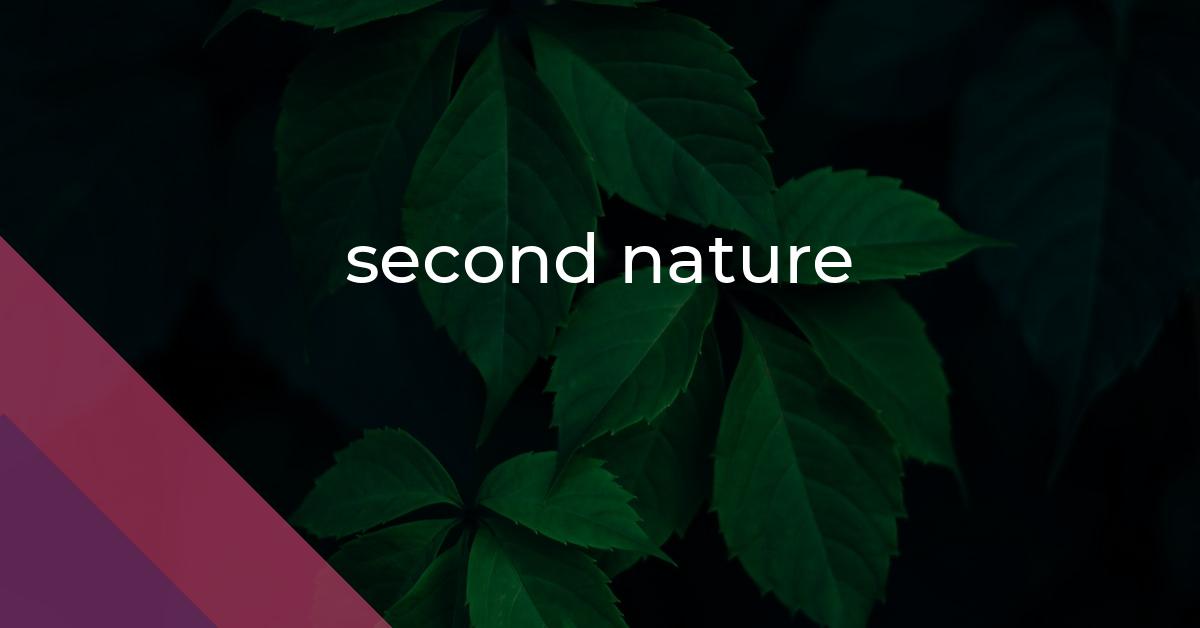second nature: Idiom Meaning and Origin
What does ‘second nature’ mean?
The idiom 'second nature' means something that is so familiar or habitual to a person that it feels natural and effortless. It refers to a behavior or skill that has been practiced and repeated so often that it becomes automatic, like a reflex.

Idiom Explorer
The idiom "second string" refers to a person who is not as important or skilled as someone else in a particular situation or role.
The idiom "second-rate" refers to something of inferior quality or standard compared to others in the same category.
The idiom "second gear" refers to the next level of effort, speed, or intensity in a particular activity or situation. It implies a higher level of performance or action being taken compared to the initial phase or starting point.
The idiom "second fiddle" means to play a subordinate or less important role compared to someone else, often feeling overshadowed or unnoticed.
The idiom "second childhood" refers to a period in a person's life when they exhibit childlike behavior and interests, often due to old age or illness.
The idiom "same old story" means a situation or story that is repetitive, familiar, and uninteresting due to its lack of change or variation.
The idiom "on second thought" indicates a change of mind or opinion after reconsidering a decision or viewpoint.
The idiom "once again" means to do something repeatedly or to have a recurring event or situation. It implies that something has happened before and is happening again. It can also indicate a sense of familiarity or predictability.
The idiom "old hand" refers to someone who is experienced or skilled in a particular activity or job.
The idiom "new normal" refers to a situation or condition that has become standard or expected, often resulting from a significant change or event, and which may require adjusting one's behavior or expectations accordingly.
Inherent Instinct
Second nature is an idiom commonly used in English to describe something that has become automatic or instinctive due to frequent repetition or practice. It refers to a skill or behavior that has become so ingrained in someone's routine that it no longer requires much thought or effort.
The phrase "matter of course" can be related to the concept of second nature. When something becomes second nature to us, it becomes a matter of course, meaning it is expected or usual. For example, imagine someone who has been playing the piano for many years. Playing the piano has become second nature to them, so it is a matter of course that they can effortlessly play beautiful music.
The idiom "better nature" can also be connected to second nature. When something becomes second nature, it often brings out our better nature. By repeating virtuous behavior, we can cultivate habits that become second nature and align with our true character. For instance, if someone practices kindness and empathy consistently, these qualities may become second nature to them, bringing out their better nature in their interactions with others.
Another idiom related to second nature is "back of one's hand." When something becomes second nature to us, we know it like the back of our hand. It means that we are extremely familiar with it and have a deep understanding. Think of a professional chef who has been cooking for years. Different cooking techniques have become second nature to them, and they know them like the back of their hand.
The idiom "go without saying" is also relevant to the concept of second nature. When something has become second nature to us, it goes without saying, meaning it is so obvious or well-known that it doesn't need to be explicitly stated. For example, imagine someone who has been a professional athlete for many years. Their dedication to training and healthy habits has become second nature to them, and it goes without saying that they prioritize their physical well-being.
"creature of habit" is another idiom that can be associated with second nature. When something becomes second nature to us, we become creatures of habit. It means that we have formed a strong routine or pattern of behavior around that particular skill or action. For instance, if someone has a daily exercise routine that has become second nature to them, they have become a creature of habit when it comes to their fitness regimen.
Today, the idiom "second nature" is commonly used in both spoken and written English. It is used in a variety of contexts to emphasize the automatic or instinctive nature of certain actions or skills. For example, someone might say that driving has become second nature to them after years of experience, indicating that they can now drive without much conscious thought.
When something becomes second nature, it goes beyond being a skill or behavior that we have learned. It becomes a part of who we are, aligning with our true character and nature. It is something that comes naturally to us, without any conscious effort or thought. The phrase "second nature" embodies the idea that through practice and repetition, we can develop habits and skills that become deeply ingrained within us.
The idiom "second nature" has become an integral part of the English language, often used to convey the idea of automaticity and proficiency. Its origins in ancient Greek philosophy and its subsequent adoption in English demonstrate its enduring relevance and popularity. By understanding the related idioms, such as "matter of course," "better nature," "back of one's hand," "go without saying," and "creature of habit," we can further appreciate the depth and versatility of the concept of second nature.
Example usage
Examples of how the idiom "second nature" can be used in a sentence:
- After years of practice, playing the piano became second nature to her.
- As a firefighter, his quick response to emergencies was second nature.
- For the experienced chef, whipping up a gourmet meal was second nature.
More "Habit" idioms



